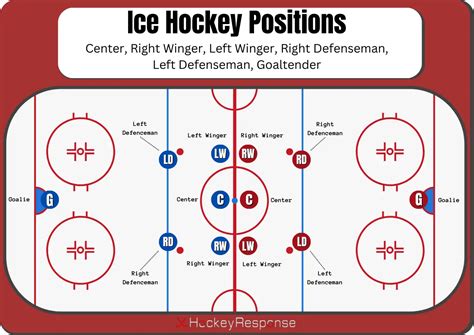Explore the significance of mental toughness in hockey, techniques to develop it, the role of coaches, real-life examples, and performance metrics.The Importance Of Mental Toughness In Hockey
In the high-stakes environment of hockey, physical skill is just the tip of the iceberg. Mental toughness serves as the foundation for success on the ice, influencing everything from decision-making under pressure to resilience in the face of adversity. As players navigate the challenges of competition, the ability to maintain composure and focus becomes paramount. This article explores the critical role that mental toughness plays in hockey, offering insights into techniques for players to fortify their mental resilience, the pivotal role of coaches in nurturing this quality, and compelling real-life examples where mental fortitude has shaped game outcomes. By measuring the importance of mental toughness through performance metrics, we can better understand its impact on the game. Whether you’re a player, coach, or passionate fan, discovering the nuances of mental toughness will deepen your appreciation for this essential element of hockey.
Understanding The Importance Of Mental Toughness In Hockey
In the high-stakes world of hockey, players are constantly faced with challenges that demand not only physical prowess but also significant mental resilience. The ability to stay focused, push through adversity, and maintain composure under pressure has become increasingly vital. Understanding the importance of mental toughness in hockey can be a game-changer for athletes striving for excellence on the ice.
Mental toughness encompasses various components, including confidence, resilience, and emotional control. These traits allow players to bounce back from setbacks, remain focused during intense moments, and execute strategies effectively. In a sport where a single play can determine the outcome of a game, the mental game is arguably as essential as skill and strategy.
Moreover, athletes with strong mental toughness are often seen as natural leaders on their teams. Their ability to inspire and motivate teammates can enhance overall team performance. By demonstrating resilience in challenging situations, mentally tough players contribute to a more cohesive and determined team dynamic.
Recognizing the importance of mental toughness is crucial not only for players but also for coaches and support staff. They play a vital role in cultivating and nurturing these traits, ensuring that athletes are not only prepared physically but also mentally. Training programs that incorporate mental conditioning can significantly improve a player’s approach to the game.
Understanding the importance of mental toughness is essential for players at all levels of hockey. By developing these skills, athletes can enhance their performance, contribute positively to their teams, and ultimately enjoy a more fulfilling experience on the ice.
Techniques To Build Mental Toughness For Hockey Players
Building mental toughness in hockey players is crucial for enhancing their performance on the ice. Below are some effective techniques that can help players develop the necessary mental resilience:
| Techniques | Description |
|---|---|
| Visualization | Players should practice visualizing themselves successfully executing moves, overcoming challenges, and achieving their goals during matches. This mental rehearsal can boost confidence and prepare them for real-game scenarios. |
| Goal Setting | Setting specific, measurable, achievable, relevant, and time-bound (SMART) goals helps players maintain focus and motivates them to push through obstacles. Goals should reflect both personal and team aspirations. |
| Positive Self-Talk | Encouraging positive affirmations can combat negative thoughts and enhance self-esteem. Players should develop a habit of reminding themselves of their strengths and past successes. |
| Mindfulness and Meditation | Practicing mindfulness can help players manage stress and maintain composure during high-pressure situations. Regular meditation provides tools to stay present and focused. |
| Embracing Challenges | Players should be encouraged to step out of their comfort zones regularly. Facing difficulties head-on builds resilience and prepares them for on-ice challenges. |
| Routine Development | Establishing pre-game and post-game routines can create consistency and a sense of control, allowing players to mentally prepare for games while reflecting on performance. |
By incorporating these techniques, players can enhance their importance of mental toughness, leading to improved performance and greater success in hockey.
The Role Of Coaches In Developing Mental Toughness
Coaches play a pivotal role in shaping the mental toughness of hockey players. They are not just instructors of skills and tactics but also critical mentors who influence the psychological resilience of their athletes. Developing the importance of mental toughness begins with the coach’s philosophy and approach to training.
Here are some key ways in which coaches can foster mental toughness among players:
| Coaching Strategies | Description |
|---|---|
| Positive Reinforcement | Encouraging players to embrace challenges and rewarding them for persistence helps build confidence and resilience. |
| Setting Goals | Establishing both short-term and long-term goals gives players a clear direction and helps them cope with setbacks. |
| Simulated Pressure Situations | Practicing under pressure during training prepares athletes for high-stakes game scenarios, enhancing their mental fortitude. |
| Open Communication | Encouraging players to express concerns and emotions creates a supportive environment, allowing them to process stress effectively. |
| Promoting a Growth Mindset | Teaching players that failure is a natural part of growth helps them to view challenges as opportunities for improvement. |
Incorporating these strategies into training can significantly enhance the mental resilience of hockey players. Coaches who recognize the importance of mental toughness will not only guide their athletes to improve their performance but also contribute to their overall development as individuals both on and off the ice. The commitment to fostering a mentally tough culture can lead to significant benefits, ultimately impacting game outcomes and player longevity in the sport.
Real-Life Examples Of Mental Toughness Impacting Game Outcomes
The field of hockey is replete with instances where the importance of mental toughness has manifested in pivotal game moments. One glaring example is the performance of the 1980 U.S. Olympic hockey team, famously known as the Miracle on Ice. The underdog team, facing off against the dominant Soviet Union, showcased unparalleled mental resilience. Despite trailing 3-2 in the final moments, they maintained their composure and ultimately claimed victory, a testament to the power of belief and mental fortitude.
Another noteworthy instance occurred during the 2010 Stanley Cup playoffs when the Philadelphia Flyers made a stunning comeback against the Boston Bruins. Down 0-3 in the series, the Flyers demonstrated mental toughness by harnessing their focus and determination to win four straight games. This remarkable turnaround highlighted how mental strength can transcend technical skill, allowing teams to achieve improbable outcomes.
In individual player contexts, hockey legends like Wayne Gretzky and Sidney Crosby exemplify the benefits of mental toughness. Their mental resilience during high-pressure situations—such as clutch playoff games—has often led to critical plays that changed the course of matches. Their ability to stay calm and composed serves as an inspiring model for emerging players, reinforcing the importance of developing mental tenacity.
These examples underline that mental toughness is not merely an attribute; it’s a vital component that can determine the outcome of crucial matches. Coaches and players alike should focus on nurturing this quality to enhance performance, reinforcing the importance of a strong psychological framework in successful hockey careers.
Measuring The Importance Of Mental Toughness In Performance Metrics
Quantifying the impact of mental toughness in hockey can be complex, yet various performance metrics can provide insights into how The Importance of this psychological construct influences game outcomes and player development. Here are some ways to measure mental toughness:
By integrating these methods of measurement, coaches and players can better understand how The Importance of mental toughness directly correlates with improved individual performance and, ultimately, team success on the ice.
Frequently Asked Questions
What is mental toughness in hockey?
Mental toughness in hockey refers to the psychological resilience and ability of players to remain focused, composed, and determined during high-pressure situations and challenges on the ice.
Why is mental toughness important for hockey players?
Mental toughness is crucial for hockey players because it helps them withstand the physical and emotional demands of the game, enabling them to perform at their best, especially during critical moments.
How can players develop mental toughness?
Players can develop mental toughness through various methods such as setting realistic goals, practicing visualization, engaging in mindfulness techniques, and learning from setbacks and challenges.
What role do coaches play in fostering mental toughness?
Coaches play a vital role in fostering mental toughness by encouraging a positive mindset, providing constructive feedback, promoting resilience, and creating a supportive team environment.
Can mental toughness impact a team’s overall performance?
Yes, mental toughness can significantly impact a team’s overall performance by improving teamwork, boosting morale, and enhancing the players’ ability to respond to adversity, leading to better outcomes.
What are common characteristics of mentally tough athletes?
Common characteristics of mentally tough athletes include self-discipline, confidence, focus, a strong work ethic, adaptability, and the ability to remain calm under pressure.
How can sports psychology contribute to developing mental toughness?
Sports psychology can contribute to developing mental toughness by providing players with tools and strategies to enhance their mental skills, improve their emotional regulation, and increase their overall resilience in competitive situations.









